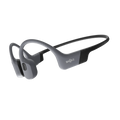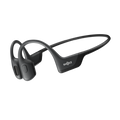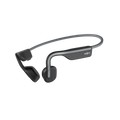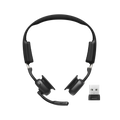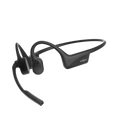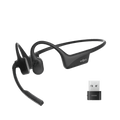
Meet our October Interview guest, Todd Short. As a disabled veteran who overcame adversities, Todd’s story is nothing short of inspiring. When doctors told Todd he would be in a wheelchair, he refused to let his prognosis dictate his life. By tapping into his mental and physical perseverance, he was able to combat his fate and rediscover a love for fitness.
AfterShokz: How has being in the military shaped you as a person and athlete?
Todd: I grew up in a very disciplined family. Disciplined in a good way. The military was an easy transition for me. I had no problem taking instructions, or with the physical aspect of the military. One thing that I feel the military instilled in me is the knowledge that I can push myself through most anything. When I feel like giving up during a race or workout, I frequently tell myself, "you've been through so much worse than this," and that keeps me going. Giving up is not an option for me.
AfterShokz: As an avid runner, what was your initial reaction when you found out your prognosis might include being in a wheelchair?
Todd: When I first heard that I had degenerative issues and I’ll end up in a wheelchair, I freaked out. I initially took in everything the Veterans Affairs told me and became depressed. I put on a lot of weight and was going down a terrible path that would have ended up with me in a wheelchair sooner rather than later. Veterans Affairs kept prescribing painkillers, muscle relaxers, and nerve blocking medication, and soon I became addicted. My desire for working out or running was gone.
AfterShokz: How has running changed your life?
Todd: I’m not sure what changed, but something triggered my former athletics and love of competition. I weaned myself off the drugs and started walking, hiking and eventually running. I signed up for some local races and haven’t looked back. I’m off all prescription medications, lost weight, and run almost every day. I use running for the physical benefits and even more for the mental benefits. When I’m angry and depressed, running always cheers me up. Running has truly changed my personality, making me a more positive, happy, and driven person.
AfterShokz: How have your personal fitness goals changed over time?
Todd: I originally had the idea of running 160 km per week, but my running coach and I started off the right way. We gradually increased my miles each week. I was so excited to see some great returns based on that higher mileage, but after a few 80-96 km weeks, my body started fighting me. Arthritis in my foot hit first. I got a steroid shot, a custom orthotic, and took some time off to recover. I started ramping up towards 96 km weeks again, and then knee pain caused by my gluteus medius hit. After that, I realized that my body does not like anything over 80 km a week, and I had to adjust my expectations. I have to remember that I am a disabled veteran with some medical issues. Now I train with that knowledge and my coach gives me different workouts to avoid the higher mileage.
AfterShokz: Why do you prefer trail running over road running?
Todd: My first and only marathon was the BMO in Vancouver, BC and the entire run was on pavement. The road pounding caused significant knee pain and put me down for a few months recovering. That’s when I decided to stay on the trails. Trail running is easier on my knees and back. The trail also offers me a sense of tranquility. It's hard for me to put into words the feelings I get out there. Every time I go adventure out on a new trail, I’m so taken aback at the entire experience. There are times I’m blasting a trail and all of the sudden I get an overwhelming feeling to stop, look, listen, and feel. That is an old Army infantry thing.
AfterShokz: What’s your favourite motivational quote?
Todd: I honestly don't have one, but I've been known to scream “I love the way this sucks” during a race or hard workout run. I don't think that would be motivation to most people though. I guess you can take the boy out of the Army, but you can’t take the Army out of the man.
AfterShokz: How were you introduced to AfterShokz?
Todd: I saw an AfterShokz display at a store, and when I tried them on I was amazed by the sound quality. But what was more surprising is that I could still hear the camera guy talking while I was listening to the music. Later that day I sent out a tweet asking if anyone had tried AfterShokz headphones and I got some great responses – everyone was telling me how much they loved them!
AfterShokz: How does AfterShokz fit into your active lifestyle?
Todd: I absolutely love my AfterShokz. They are so light that I don't even feel them on my head and they fit perfectly with my hat and sunglasses. When I’m on the trail, there are times I turn the music off to “look, listen, and feel," but I never feel the need to take off my headphones because they're so incredibly comfortable. I’m also amazed by the battery life and how long a charge lasts.
AfterShokz: How does the open-ear design of AfterShokz headphones benefit you while running trails?
Todd: I frequently run in a busy park where there are a lot of hikers, mountain bikers, and even horseback riders. AfterShokz allow me to hear my surroundings – people, bike bells, and even wildlife in the bushes. Unfortunately, someone in my family was abducted off a trail (she’s okay now!), so safety and awareness are both so important to me. I was recently on a trail where a fellow runner had earbuds in; she didn’t hear me approaching from behind, and I scared her. After I apologized, I showed her my AfterShokz headphones, and she was instantly a fan. That’s one safer trail runner out there.
AfterShokz: What kind of awareness do you hope to raise through running?
Todd: I work with a lot of disabled veterans, and most of them are right where I was years ago. They believe that their disabilities will not allow them to be active. I hope they see what I do and are encouraged to get off the couch and hit the trails. For me, it took running out of pain medications to realize how addicted I was - this was my wake up call. I don't want others to have to get to that place before making a change. If I can do it, anyone can. One foot in front of the other.

